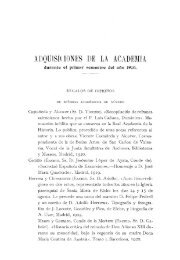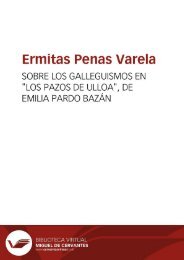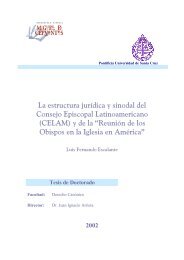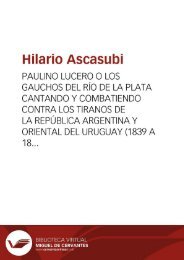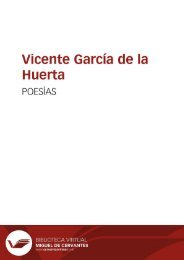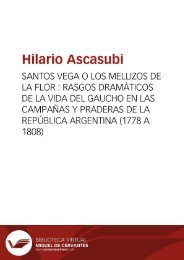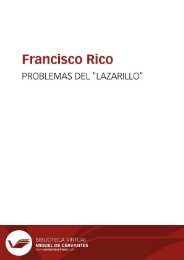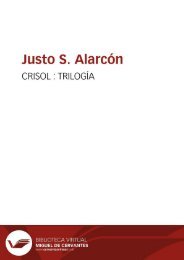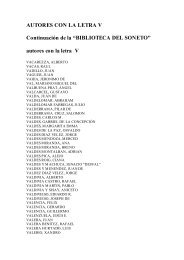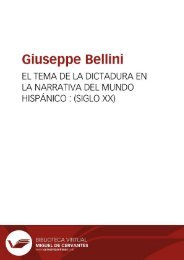You also want an ePaper? Increase the reach of your titles
YUMPU automatically turns print PDFs into web optimized ePapers that Google loves.
Anales galdosianos [Publicaciones periódicas]. Año XII, 1977<br />
to bear on Máximo by Manuel when he persuades his mentor to stop at an unphilosophical buñolería<br />
at the unphilosophical hour of four A.M.: « Transacción... Procuremos conciliarlo todo, como dice<br />
su hermano de usted » (90). It is one of the many ironies of the novel that Máximo transige much<br />
more than he ever realizes, although he does speak of the problem on several occasions, particularly<br />
in the light of Manuel's duel (105).<br />
The height of Máximo's coming to terms with his society is in his consenting to speak at the velada<br />
along with any number of cursis before a popular audience. On this occasion Manuel, the man for<br />
the century 111 , triumphs, and Manso fails, whereupon his brother tells him, « Nunca serás nada...<br />
porque no estás nunca en situación. ¿Ves tu discurso de esta noche, que es práctico y filosófico y<br />
todo lo que quieras? Pues no ha gustado, ni entusiasmará nunca al público nada de lo que escribas, ni<br />
harás carrera, ni pasarás de triste catedrático, ni tendrás fama... Y tú, tú eres el que hace en mi casa<br />
propaganda de modestia ridícula, de ñoñerías filosóficas y de necedades metódicas » (125-126). 112<br />
The shifting mixtures of active and passive in the brothers Manso and in their relationship with<br />
Manuel reach their apogee in the triple courtship of Irene, in which, of course, the younger man<br />
cuckolds the two Mansos, each proceeding according to his established character: José María brutal<br />
and unscrupulous, Máximo timid and analytical, while Manuel merely acts with the natural vitality<br />
and drama of youth. Later Máximo laments that, unlike Manuel, he was not Adam but rather the<br />
methodical angel defending the gates of the paradise of reason (200). The role of Manuel, then, as<br />
simultaneous protegé and rival of both the Manso brothers is rather elaborately worked out as part of<br />
the mansedumbre motif of the novel. Irene's saying that the two brothers are « el día y la noche<br />
» (101) should not mislead us. <strong>Galdós</strong> has used such complex and superficially contradictory name<br />
symbolism elsewhere. The Miau manuscript reveals that the unloved Villaamil sisters, Luisa and<br />
Abelarda -the author's draft changes suggest it- take their names from the medieval lovers Héloïse<br />
and Abelard, despite the sex change and inappropriate relationship 113 . The irony of their relationship<br />
to Víctor, the unworthy man they both love, it thus expressed. For related artistic reasons Tristana, in<br />
the novel of the same name, is not called Isolda.<br />
111 « Parece que en él ha querido la Naturaleza hacer el hombre tipo de la época presente. Está cortado<br />
y moldeado para su siglo, y encaja en éste como encaja en una máquina su pieza principal » (129).<br />
112 One is reminded of the equally decisive climax in discurso form of a later <strong>Galdós</strong> novel,<br />
Torquemada en el Purgatorio .<br />
113 Robert J. <strong>Web</strong>er, The Miau Manuscript of Benito Pérez <strong>Galdós</strong> (Berkeley, 1964), p. 47.<br />
82





